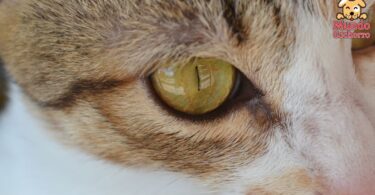One of the best known characteristics of cats is their curiosity and their particular tendency to play with anything they consider prey.
Indice
Something that triggers very funny moments and anecdotes capable of surfing the internet, but unfortunately not everything is laughter and games.
Despite the widely developed capabilities of felines, they are still vulnerable to bites and wounds caused by other animals in the event of an encounter, whether for play or hunting.
And this is where serious damage to your health can occur if appropriate measures are not taken.
One of the main protagonists of this concern for owners are spiders, as they are animals that are lived with daily and can be deadly depending on the species.
But can spiders be a threat to your cat?
The relationship between spiders and cats
Cats are highly effective hunters, with visual and auditory senses that allow them to win most of their battles.
For this reason, it is not common for them to be harmed by some of their smaller potential prey, which are usually insects and arachnids that share space with them.
During the years with the feline, at least once he will have been seen playing with a spider, and depending on how things develop, the cat may end up killing it, or it may be the owner himself who decides to intervene out of fear.
Whether or not a spider can be a threat to a feline depends on many factors, but the main one is the species of this arachnid, which is influenced by the habitat where it is found.
In many places, spiders found in homes are not harmful to felines and can be eliminated by the cats themselves because of their incessant play.
But when the kitty has to coexist with dangerous species, the risk of a bite rises, because just as the cat has the tools to attack, the spider has a highly damaging weapon to defend itself.
Although known cases of death are few, the possibility exists, especially if the antidote is not provided in time.
Most spider bites to cats occur when the cat selects them as a target for play, and most commonly in non-harmful species they provoke an allergic reaction in the cat.
We recommend you to read:
https://mundocachorro.com/aranas-venenosas-y-gatos/
How to detect a spider bite in cats?
Although minimal, the possibility of a cat receiving a spider bite exists, so it is an option that cannot be ruled out if the animal begins to show symptoms of discomfort or changes in behavior.
Knowing if a cat has been bitten is a complicated task, since in some cases (in the case of non-harmful spiders) there are no symptoms or they are usually very mild.
In cases of both venomous and non-venomous spider bites, allergies and irritation in the affected area may occur, as well as fever and dizziness.
With the venomous spiders
With venomous spiders, symptoms can vary greatly depending on the way their venom attacks the animal’s organism, which can result in symptoms such as fevers or allergies, as well as motor and respiratory problems.
For this same reason, and if possible, it is recommended to capture the spider so that doctors can identify the type of toxin and provide the appropriate antidote.
What happens if a spider bites a cat?
Here are some things you should know about whether a spider bites a cat:
Depending on the spider species and its toxicity, a bite can cause from minor irritation to more serious effects.
The most common spiders that might bite a cat are not considered very poisonous to cats.
The bite will most likely cause pain, discomfort and swelling at the site of the bite.
It is also possible that the cat may show more general symptoms such as lethargy or lack of appetite .
In rare cases, if the bite is
bite is from a very venomous spider, more severe symptoms such as breathing difficulty
In rare cases, if the bite is from a very venomous spider, more severe symptoms such as difficulty breathing, convulsions or swelling of the tongue or face may occur.
It is important to monitor the cat after a bite and go to the veterinarian if signs of discomfort are observed or if symptoms worsen or do not improve after a few hours.
The veterinarian may apply a topical or systemic antihistamine to control inflammation and itching.
In more severe cases an antidote would be given. Most spider bites are not serious for cats and resolve on their own, but it is good to watch for any reactions.
A visit to the veterinarian will help to rule out possible toxic effects. The important thing is to keep an eye on the cat, make it comfortable and take it to the veterinarian for any persistent symptoms or worsening after the bite.
Can a cat die from a spider bite?
Yes, it is possible for a cat to die from the bite of certain venomous spiders, although this is relatively rare.
Some key points: Most common spiders are not lethal to cats.
However, if the bite is from a highly venomous spider such as the black widow, it can be potentially fatal to a small cat.
Factors such as the size and health of the cat, as well as the amount of poison injected, influence the severity of the effects.
Puppies and smaller or sick cats are more at risk.
Symptoms of a potentially fatal bite may include vomiting, diarrhea, convulsions, difficulty breathing, low blood pressure and progressive muscle paralysis.
If medical treatment is not provided in time, the effects of the poison can lead to cardiorespiratory arrest and death.
It is important to act quickly by taking the cat to the veterinarian for antivenom serum or other supportive treatments as needed.
With prompt veterinary care, the survival rate is high even in cases of lethal spider bites.
But the longer it goes on, the riskier it is.
To summarize, it depends on the spider and the severity of the symptoms, but it is possible for a cat to die if it does not receive immediate medical attention after a highly venomous bite.
That is why it is important to be vigilant and take it to the veterinarian without delay.
Image courtesy of (en.point.pet), all rights reserved.







